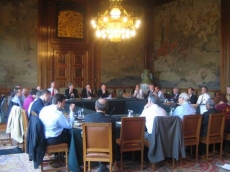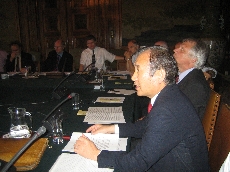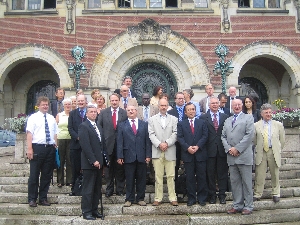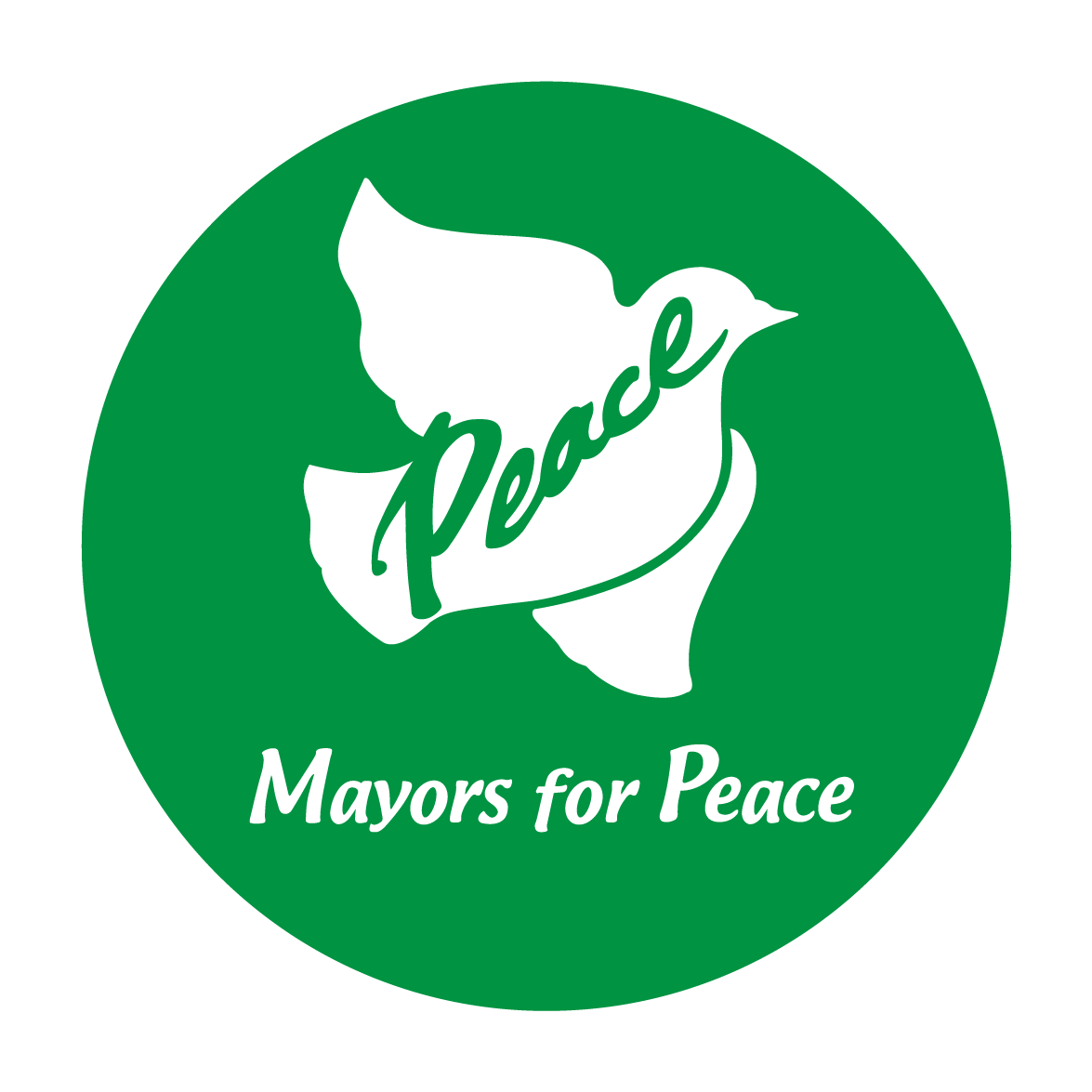Organized by Mayor for Peace
Dr. Tadatoshi Akiba, Mayor of Hiroshima, Japan, President of Mayors for Peace

Thank you very much for your kind introduction, John, Kate, Judge Weeramantry, and fellow peace workers. It is my pleasure and honor to be here, and I would like to start my remarks by thanking all of you on behalf of the hibakusha of Hiroshima and Nagasaki for the work you have done which culminated in the historic advisory opinion by the ICJ 10 years ago. And I would also like to thank you on the hibakusha’s behalf for the work you are continuing to do to implement the spirit of the advisory opinion, which I hope will culminate in the elimination of nuclear weapons by 2020.
In that spirit, we are thinking about nuclear weapons right now, of course, but when one contemplates nuclear weapons one contemplates the fate of cities and civilization itself. The two nuclear weapons that have been used were dropped on cities; destroying Hiroshima and Nagasaki in seconds, and condemning most of their surviving citizens to shortened lives and much misery for years. Nuclear weapons, even so-called ‘mini-nukes’, are too powerful and radioactive to be used without causing widespread harm to civilian populations. The Court was right to find their use and threat of use to be generally contrary to international humanitarian law.
So it should be no surprise that mayors have taken the lead in commemorating the 1996 ICJ Advisory Opinion. I have no doubt that the mayors of Hiroshima and Nagasaki had a salutary effect on the Court’s deliberations, and certainly the lives themselves of the hibakusha had a similar and probably greater effect on their decisions. I do not need to repeat their accounts of mass tragedy here today; in a month’s time we will mark the 61st anniversary of the destruction of Hiroshima. While superficially, as many of you have observed, the deep wound inflicted on my city appears to have healed, the painful memories remain unhealed. These memories should never be forgotten, and it is the profound obligation of new generations to keep them alive as we struggle to rid the world of this most inhuman threat.

Consider for a moment these words I have just used: cities, citizens, civilian, and civilization. They all derive, of course, from the same Latin root. Cities were the cradles of every civilization, and it is just as true today. For all their many problems, modern cities are the repositories of everything that makes civilization sustainable. They are the crossroads where we meet and do commerce and exchange ideas; they are where we keep our great treasures of art and knowledge; many are themselves treasures of architecture and public spaces. They are where the concept of law first took root, and where the highest courts of law are found today everywhere in the world. Indeed, it was legal institutions that made cities possible. You cannot crowd tens of thousands of people into a small area and expect them to co-exist and lead productive lives without the rule of law, a ‘civil’ code.
Cities have led the world in business, art, education and many other worldly fields, and cities in the 21st century will continue to lead in most of these areas. As a matter of fact, we have come to the conclusion during the first Japan-US Cities Summit held in Hiroshima 2 years ago that the 21st century will be a century of “cities”. In this sense, I think it is most fitting that the World Urban Forum and the World Peace Forum were recently held back-to-back in Vancouver, Canada. While we have been raised to look to our national governments to provide security and prosperity, perhaps it is time to look a little deeper. Cities need to step forward to support international efforts, especially when the nation state is failing to deliver.
Is there any doubt that the current multiple-impasses in nuclear nonproliferation and disarmament represent a profound failure on the part of our national governments? Cities cannot afford to let these problems fester and erupt. We will be the victims without a doubt. We have been given more warning than anyone should ever need. So much so that we have become inured to it! Nuclear deterrence as ‘perfected’ during the Cold War period and still practiced consists of holding the adversary’s population, that is, cities, hostage to nuclear annihilation. The warning could not be clearer: the strategy is called Mutually Assured Destruction – MAD!
Later today in City Hall, we will officially announce the launching of our “Cities Are Not Targets” project. Cities across the world will break out of the Cold War spell and mutiny against the tyranny of nuclear MADness. We will no longer be the docile hostages to such inhuman and illegal threats. But, here in this historic setting on this historic occasion I wish to focus on our broader perspective, one that is not confined just to cities and mayors, but pertains to civil society as a whole, Good Faith. I would like to offer the perspectives of mayors and cities to compliment what Judge Weeramantry so elegantly explained to us.
Laws cannot serve their purpose if the key players in society treat the law with disregard. Good faith is an essential part of any functioning society. A mayor is entrusted with the faith and fate of the citizens. It is not enough that the mayor not break the law. The mayor must act in good faith at all times, even when tempted by power and wealth to do otherwise. I believe it is fortunate that mayors and cities have a great advantage in this respect in comparison with others in public office. We mayors must carry out our business in direct contact with the people. Our proximity to our citizens keeps mayors honest, making it easier to carry out our obligations.
When the nations of the world gathered to prevent and reverse the spread of nuclear weapons, they established legal norms that relied in good measure on good faith. In Article Six of the treaty, the term is used explicitly. In that article, the five nations that had acquired nuclear weapons were called upon to relinquish that power on the basis of negotiated, verifiable agreement.
The question now is, have the powerful succumbed to the temptation of power and chosen to disregard the law? Judging by the lack of substantial results, particularly since this obligation was highlighted by the finding of the International Court of Justice ten years ago, we can only conclude that at least some of them indeed have. This is a heavy indictment, one that should give us all pause. What is the future of a world in which those who wield nuclear weapons cannot be trust to act in good faith?
Fellow peace workers, it is with this dreadful prospect in mind that Mayors for Peace is issuing a challenge to every citizen on Earth: the Good Faith Challenge. It is the sacred duty of all of us to cultivate good faith, to cultivate peace. Civil order and civilization itself depend upon it more than ever. Terrorists who have turned their backs on civilization cannot be expected to act in good faith, but surely our leaders can and must be expected to do so. The ultimate test of this is Article VI and the ICJ finding. If our national leaders cannot resist playing Russian roulette with our cities, then perhaps it is because we have not challenged them to stop. Not just mayors, but people in every walk of life must challenge their leaders to reverse course, to embrace the rule of law, especially international law.
We have heard today about the World Court Project. Today there are hundreds of projects around the world in which people are calling upon their governments to show good faith toward nuclear nonproliferation and disarmament. These good citizens, good doctors, and good lawyers, are encouraging good mayors to get involved. In this second phase of the 2020 Vision Campaign, we will be urging our members to join forces with their citizens and provide support and leadership whenever appropriate.
Like most things, there are two sides to good faith. While it is essential to go to the negotiations and put everything – the entire arsenal – on the table, that alone is not sufficient. That is “talking the talk,” as they say. You also have to “walk the walk.” In other words, to borrow Judge Weeramantry’s words, there must be a faithful correspondence between the words and the deeds. Agreements that have been reached have to be scrupulously implemented. If you have signed a Safeguards Agreement with the IAEA you have to abide by it. If you have signed a treaty you have to ratify it. Just a year after the ICJ advisory opinion, the CTBT was opened for signature at UN Headquarters. The United States was the first to sign, but now, nine years later it is the only country to declare its intention not to ratify. That is not acting in good faith, and we look to the American people to rectify that.
But there are other ways governments fail to walk the walk. Successful negotiations depend on confidence in the good faith of negotiating partners. Nuclear threats of any form undermine that confidence. Particularly pernicious are threats that would initiate nuclear warfare, so called pre-emptive strikes. In that realm, cities are not hostages but free game! We are so impressed that the U.S. Conference of Mayors, in advancing the principle that cities are not targets, also drew the line against first use of nuclear weapons against any target. I expect we will hear more about that from our American colleague, Mayor O’Grady, later.
Mayors for Peace will encourage its members, now almost 1400 in 117 countries and regions, to speak out against casual allusions to the use of nuclear weapons, particularly when they come from people in positions of authority. And we hope our members will find ways to support civil society campaigns against dangerous threat policies and dangerous threat postures such as launch on warning. This applies not just to the nuclear-armed states, but also to allies that allow forward deployments on their territory.
Another way that unilateral government action can undermine negotiations has to do with the acquisition of nuclear weapon systems. What does it say about one’s commitment to conclude negotiations on the elimination of nuclear weapons when one is spending one’s national treasury on new nuclear weapon systems designed to last well into the next half of this century? It would be an act of good faith to put such plans on hold, and keep them on hold as long as negotiations are making proper headway.
Mayors for Peace will encourage its members in the nuclear weapon states to challenge the expenditure of vast sums of the people’s money on weapon systems that need never come into existence, or be ‘up-graded.’ On the way here, some of my fellow mayors and I stopped by the Atomic Weapons Establishment in Aldermaston. This facility is getting a ‘new lease on life’ to produce warheads for new Trident missiles. This program certainly does not give disarmament negotiations a ‘new lease on life.’ The United Kingdom, whose nuclear policy has positive features that ought to be emulated by the other nuclear-armed states, needs to find greater coherence in its nuclear policy.
All this relates to the question of reliance upon nuclear arms. Until it is clear that the nuclear-armed states intend to end that reliance, other states will not feel bound to renounce such reliance permanently. This double message has a corrosive effect on the entire nonproliferation regime, not least the Nuclear Non-Proliferation Treaty. It also means that the powerful will be tempted to make war to prevent the weak from acquiring nuclear power status. How many such wars can the world sustain? Why should we tolerate any?

My fellow peace workers, we are already seeing the toll that the disrespect for international law extracts. Cities and countries in ruin. Young people dying far from home. The popular will of the people and the international community ignored. The need for good faith is pervasive and urgent. It begins with each citizen, each mayor, each parliamentarian, and each national leader. It must be cultivated from the grassroots to the tree tops. And it means not shying away from the big challenges, and nuclear weapons are certainly one of the biggest.
The 2020 Vision of a nuclear-weapon-free world will not seem so distant when citizens and leaders together are working hard to realize it. Good faith can work wonders.
Thank you very much.
